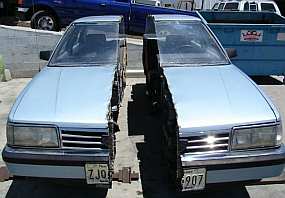My post last week on “Two Halves of the Whole Gospel” has generated some interesting conversations. I was originally intending to do a week of posts about my work, the reason this blog exists, and some tidbits about me. However, I feel the Lord tapping me on the shoulder about expanding the “Two Halves” post.
One of my concerns for the American Church is that we’re carving the Gospel up into disparate chunks, then loving our favorite chunk to the exclusion of the rest. I believe that terrible misunderstandings and errors grow like pernicious weeds because we do this. We end up missing the Lord’s best for us.
I want to begin my point here by having you all imagine a giant junkyard filled with one wrecked/junked vehicle after another for as far as the eye can see. Rusting heaps, useless, and destined for destruction.
One day, a master mechanic pulls into the junkyard behind the wheel of his rescue vehicle. He hauls some vehicles away to his garage, works on their engines, then fills them with his special fuel. A couple pumps of the accelerator and that once dead engine sputters to life.
He hauls some vehicles away to his garage, works on their engines, then fills them with his special fuel. A couple pumps of the accelerator and that once dead engine sputters to life.
In time, the master mechanic details each vehicle. Any portion of that vehicle that doesn’t work, he repairs. He removes all the rust, patches the holes, and primes, paints and buffs the results. The vehicles begin to look as they should. In fact, they begin to look a lot like the mechanic’s own rescue vehicle.
But the master mechanic is even more wise. He knows that each one of his vehicles exists for a reason. So he equips each with specialized parts that run off his unique fuel. To some, he gives wings to fly so they can journey to distant parts of the junkyard as his representatives. To others, he gives crane arms to lift other vehicles out of ditches should they run off the road. Each vehicle receives what it needs to serve. He makes each vehicle into exactly what he desires of it for his good purpose. Some are fast, some durable, some multi-functioned, some exceptionally good at a specific task, and many even help the master mechanic retrieve more wrecks from the junkyard. In the end, those once worthless vehicles become what the master mechanic intended for them to be in the first place. They fly, roll, and sail in tune because of the master mechanic, his rescue vehicle, and his special fuel.
Perhaps it’s too simple an illustration on some levels, but I believe that’s a decent explanation of the Gospel at work.
Sadly, too many of us live as if the Gospel stops once the master mechanic retrieves a few vehicles from the junkyard, tunes them up, and fills them with his fuel. If they do they little else than sit around the master mechanic’s lot, that’s fine.
But that’s a terrible error.
Those vehicles have a purpose and that purpose is as much a part of the Gospel as anything. If we fail to understand the truth that those vehicles have a destiny as tools for the use of the master craftsman, then we’ve missed Gospel truth. The equipping for service is part of the Gospel, too, for what was once useless now lives up to the reason for which it was made! That’s the Good News as much as not resting forever in a junkyard is.
What’s frightening is what happens when the vehicles on the master mechanic’s lot do nothing but hang around the lot all day. In time, the lot begins to resemble the junkyard: plenty of parked vehicles failing to do what they were created for. Eventually, those retrieved vehicles begin to sputter for they would rather hang out in the lot then go to the garage where the master mechanic can fuel and equip them for the purpose for which they exist.
It’s not enough to no longer be a wreck. If that’s what we think, then we don’t understand the whole Gospel.

 Do you sometimes feel like we’re not hearing the whole Gospel? Hang around the Godblogosphere long enough and you get the eerie feeling that no one truly knows what the whole Gospel entails.
Do you sometimes feel like we’re not hearing the whole Gospel? Hang around the Godblogosphere long enough and you get the eerie feeling that no one truly knows what the whole Gospel entails. Always skeptical, I verified the e-mailer’s story with some third-parties. Once verified, I called every resource I knew to find a way to help. I talked with many charitable organizations, dropped e-mails to large churches in the area of this person in need, spoke on the phone with probably two dozen people, but I still have not found help.
Always skeptical, I verified the e-mailer’s story with some third-parties. Once verified, I called every resource I knew to find a way to help. I talked with many charitable organizations, dropped e-mails to large churches in the area of this person in need, spoke on the phone with probably two dozen people, but I still have not found help.